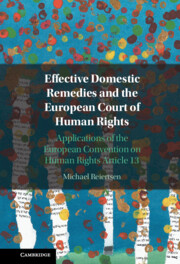 Effective Domestic Remedies and the European Court of Human Rights
Effective Domestic Remedies and the European Court of Human Rights Book contents
- Effective Domestic Remedies and the European Court of Human Rights
- Effective Domestic Remedies and the European Court of Human Rights
- Copyright page
- Contents
- Figures
- Preface
- Acknowledgments
- Citations of Case Law
- Abbreviations
- 1 Setting the Scene
- 2 Analysis and Selection of Case Law
- 3 The Requirement of Effectiveness in Abstract
- 4 Historical and Statistical Overview
- 5 Relationship with the Rule on Exhaustion of Domestic Remedies
- 6 Scope of Application
- 7 The Arguability Test
- 8 A Relative Standard
- 9 General Requirements and Principles
- 10 Access to Justice
- 11 Redress
- 12 A Normative and Contextual Reading
- 13 Conclusions and Recommendations
- Bibliography
- Index
8 - A Relative Standard
Published online by Cambridge University Press: 11 August 2022
- Effective Domestic Remedies and the European Court of Human Rights
- Effective Domestic Remedies and the European Court of Human Rights
- Copyright page
- Contents
- Figures
- Preface
- Acknowledgments
- Citations of Case Law
- Abbreviations
- 1 Setting the Scene
- 2 Analysis and Selection of Case Law
- 3 The Requirement of Effectiveness in Abstract
- 4 Historical and Statistical Overview
- 5 Relationship with the Rule on Exhaustion of Domestic Remedies
- 6 Scope of Application
- 7 The Arguability Test
- 8 A Relative Standard
- 9 General Requirements and Principles
- 10 Access to Justice
- 11 Redress
- 12 A Normative and Contextual Reading
- 13 Conclusions and Recommendations
- Bibliography
- Index
Summary
Chapter 8 accounts for factors explicitly emphasized in the Court's case law which may influence the relative standard of effectiveness arising under Article 13. Indeed, States have a margin of appreciation which provides for different possibilites for assuring effective remedies in practice, for example, in penal, civil, constitutional or administrative proceedings. However, the proceedings must satisfy the minimum requirements, of access to justice and redress. These requirements may be influced by, for example, the character and degree of the violation, the context in which the remedies operate, including whether the remedial problems stems from a systemic problem and the personal situation of the applicant. Such factors may, in practice, lead to the conclusion that only a limited selection of remedies, or even only one remedy, may be effective.
Keywords
- Type
- Chapter
- Information
- Effective Domestic Remedies and the European Court of Human RightsApplications of the European Convention on Human Rights Article 13, pp. 110 - 114Publisher: Cambridge University PressPrint publication year: 2022
